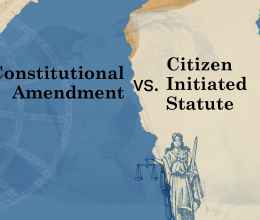On Tuesday, Athens voters overwhelmingly approved ending all penalties for marijuana possession of up to seven ounces. This ballot measure is a hidden gem in this week’s election results and deserves statewide recognition for expanding civil liberties and moving Ohio a step closer to marijuana legalization, which the ACLU has long supported. Athens is now the sixth Ohio city in which voters have used constitutional “home rule authority” to remove all marijuana possession penalties under municipal law. This “depenalization” law means that no fines, court costs or other penalties may be imposed on cannabis users. The effort goes a step beyond the state’s marijuana “decriminalization” law, adopted in 1977 and followed in most (but not all) Ohio municipalities. The state law makes marijuana possession a minor misdemeanor, subject to a fine of up to $150 but no jail time (i.e., “decriminalized”). But despite Ohio’s reputation as being one of the first states to decriminalize marijuana, our state has a dirty little secret: 41 cities with a total population of one million overrode state law and passed local laws to recriminalize marijuana. (See the list here.) In addition, 50 cities with a total population of 1.8 million criminalize marijuana paraphernalia, even though the state legislature decriminalized this offense in 2012. (See that list here.) Removing local penalties has tangible results. The recriminalization of marijuana by local governments creates criminal records for some Ohioans every year. In addition, many thousands pay fines and other fees even when the offense is treated “like a traffic ticket.” Further, “depenalization” ends the financial incentive to harass marijuana users, especially minorities disproportionately targeted for enforcement.
On a statewide scale, these ballot measures help redefine the political climate for marijuana reform. Ohio voters favor marijuana legalization but most elected officials don’t. Politicians listen when voters speak decisively.
Athens voters gave the clearest message yet for marijuana reform. The southwestern Ohio city of 25,000 (plus 35,000 students at Ohio University) voted 77% to 23% to end all marijuana penalties for up to 200 grams (7 ounces). This decisive victory was delivered despite antipathy from city officials. Since, voters in Toledo, Newark, Logan, Roseville and Bellaire have removed marijuana penalties from local law. Toledo gave the measure 70% approval, and the city has honored voters’ wishes and essentially stopped charging people for marijuana possession. Toledo even has a private membership cannabis club operating openly in a strip mall, similar to the private membership clubs in which people drank alcohol in dry places in Ohio. The irony of this reform movement is that it takes an anti-marijuana legal strategy for the “Just Say No Era” and turns it on its head. After the legislature decriminalized marijuana in 1977, some local governments rebelled and passed harsher city laws. The conflict between state and local laws went to the Ohio Supreme Court in Niles v. Howard in 1984. The ACLU of Ohio argued in an amicus brief that state law trumped Niles’ municipal law making marijuana possession a first degree misdemeanor (subject to a $1,000 fine and up to six months in jail). The Supreme Court ruled 6-1 against the ACLU’s position. It said municipalities had home rule authority to adjust misdemeanor penalties. A few years ago, marijuana using window salesman Chad Thompson realized local governments could use the same precedent to reduce marijuana penalties – even beyond state law. He successfully got voters to do that in Toledo. Today, City Councils and Village Councils can remove punishments for misdemeanor marijuana possession, yet none have done so. So far, voters have done all the reform work. To get on the ballot, activists must collect the signatures from a number of registered voters that varies by city but is generally 10% of the total vote in the previous gubernatorial election. In Columbus, the requirement is lower: 5% of the votes cast in the last mayor’s election.
Rather than waiting for an acceptable statewide referendum – a multi-million-dollar task so expensive only outside groups can do it -- Ohio residents who favor legalizing marijuana can act locally first. For now, all pot politics in Ohio is local.
*Dennis Cauchon is president of Harm Reduction Ohio, which advocates for drug reform policies based on science, health, compassion and human rights.






